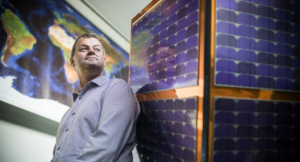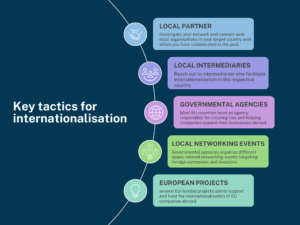Advances in the space industry, with its implications on science, the economy and the well-being of citizens, is often a priority in developed countries. However, the global space industry is over-saturated and developing countries (DCs) and newly industrialised countries (NICs) often have doubts as to their capacity to take it on as well as the necessity to also prioritise this industry in an already crowded market. Although many DCs and NICs are determined to aid in developing space capability, the budget which they are able to allocate is often modest when compared to the budgets spent by developed countries. The only available market for a newly established space industry of a developing country is the domestic market, however, satisfying national needs and competing with international companies and organisations is not easy. Although it is generally agreed that outer space should be used for the benefit of all countries, only a fraction of countries have the necessary technological capabilities to access space. Therefore, technology and knowledge transfer between countries is encouraged and supported at the governmental level.
Drawing on an interview with Mr. Steven Krekels and the journey of a Belgian research organisation that provides scientific advice and technological innovations, this article puts forth several insights into the process and challenges of the internationalisation of space-related technology and knowledge whilst safekeeping the organisation’s IP.

Mr. Steven Krekels is a Unit Manager of Remote Sensing at VITO responsible for scouting international partners and coordinating the internationalisation activities of the organisation. VITO is an independent Flemish research organisation in the area of cleantech and sustainable development. From climate change and food security to sustainable energy and resource scarcity, VITO’s research agenda focuses on helping governments and companies worldwide initiate societal transitions. They successfully fledged internationalisation activities to China, India and the Middle East. Below, we reveal some of the highlights and challenges they faced during this process.
What are the benefits of internationalisation?
In addition to the overarching benefits of internationalisation, such as broader outreach and a richer portfolio of clients, Krekels mentioned that being part of the global space ecosystem helps the organisation maintain a holistic view of the latest space technologies. In addition, the organisation gets familiar with the demands and needs of other governments and learns from local players while getting acquainted with the local talent.
How do you choose new markets?
“For our organisation, there is not a straightforward way of choosing the next location”, says Krekels. “Sometimes it is pre-set by a funding authority in the context of an EU project; other times, the countries are chosen based on the geopolitical agenda of the country“, continues Krekels. He also mentioned that certain elements favour internationalisation activities over others, such as existing competition, sharing the same national language and previous collaborations. “Once in a while, it is a matter of being in the right place at the right time”, ends Krekels.
What tools may a space company use to enter a new market?
“First and foremost, we look for local partners who can help and guide us in understating the local business and choosing the right type of business expansion”, states Krekels. “This would be one of my first pieces of advice for anyone expanding abroad, especially to another continent – find a local partner whom you can trust. Business internationalisation brings a wide range of challenges, and one should not overlook the language and cultural barriers in the whole scheme.”
Below is a list provided by Krekels of essential elements to consider when entering a new market.
- Local partner – investigate your network and try to connect with local organisations in your target country with whom you have collaborated in the past.
- Local intermediaries – reach out to intermediaries who facilitate internationalisation in the respective country.
- Governmental agencies – almost every EU country has an agency responsible for creating ties and helping companies expand their businesses abroad (see Useful links). This is even more relevant for the space sector, and depending on the national political agenda, one can enjoy strong support when entering a specific market.
- Local networking events – governmental agencies organise different space-related networking events targeting foreign companies and investors. From case to case, it can lead to future collaborations.
- European projects – several EU-funded projects aim to support and fund the internationalisation of EU companies abroad (see Useful links).

What type of challenges did you face when expanding abroad and how did you overcome them?
“I cannot stress enough the cultural differences as these are not trivial when engaging in an internationalisation activity”, emphasises Krekels. Mr. Krekels recalled several instances when the business norms were distinctly different from what we are used to in the West. For example, one legal challenge they faced was being allowed to open an office in the UAE. In order to do that, the director of VITO had to fly over and pass a business exam provided by the state and prove his knowledge in the field (he passed it 😉). “Customs clearance of our technology can become a challenge that requires extensive preparation and legal support”, recalls Krekels. “Depending on the country, another challenge is keeping a distance from the black market. You will be surrounded by people who justify illegal activities as local business norms such as pricelists for officials or offering extravagant gifts when meeting key decision-makers”, says Krekels. “In these situations, you have no choice but to stand your ground. Do not accept any favours, as these favours can become financially and reputationally expensive”, ends Krekels.
What is your key piece of advice on safekeeping a company’s IP when going abroad?
“Do your homework, talk with other peers in the industry who went through the same process and be aware of all the risks you are exposing yourself to. I tell my team to go there and be quick enough. Don’t forget that once you step into countries with a weak rule of law, nothing can protect you, even an IP patent. The last thing you want is a trial against a government, which most of the time will bring to nothing; therefore, show enough to sell but don’t show too much to be taken advantage of and look into sealing the partnership as fast as possible”, concludes Krekels.
Below you can find a brief introduction to the current internationalisation endeavours of VITO retrieved from their website.
The Middle East | With offices in Qatar and in the United Arab Emirates, VITO is now helping many Gulf stakeholders and companies of all sizes and sectors to innovate, optimize and re-evaluate – and to develop more sustainable ways of working.
India | As VITO wants to accelerate the transition to a sustainable world, they work in India, where fast transitions are taking place and where we can have an impact. VITO has undertaken research projects in collaboration with India since 2007, starting with bio-economy and green chemistry. They also provide services related to air quality, wastewater and organic waste treatment, smart cities, CO2 conversion, river basin management and capacity building on sustainable development practices.
China | In the recent years, VITO has made a significant progress in valorization and commercialization in China. Following are some projects examples that VITO has concluded in recent years, either directly, or through its subsidiary VITOAsia/LIBOVITO.
If you are a space company considering exploring new markets, check out these links:
Governmental agency for Flanders region: https://corporate.flandersinvestmentandtrade.com/en
EU project that facilitates internationalisation to Australia and Chile: https://www.connect-eo.eu/
EU project that facilitates internationalisation to India: https://euindiainnocenter.eu/